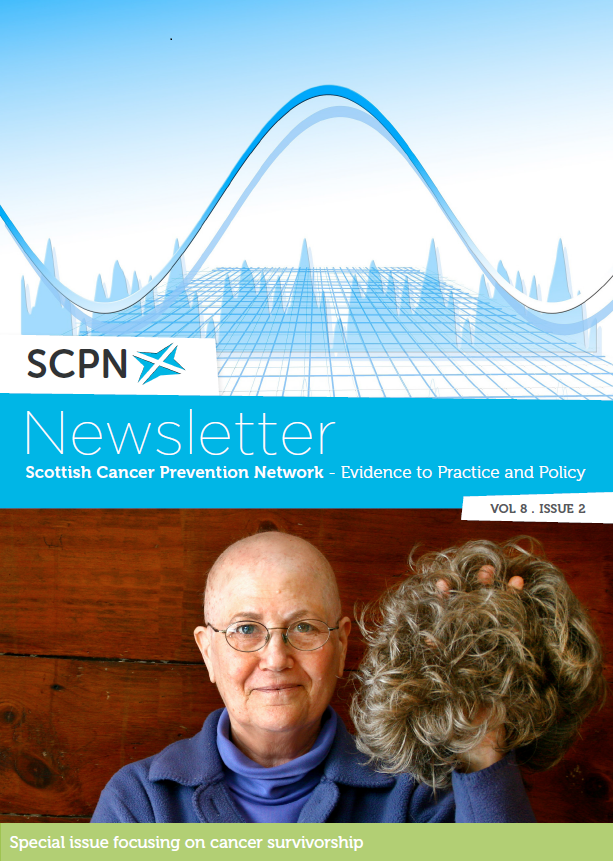
Evidence surrounding cancer survivorship

01 May 17 |
by Debbie Provan RD
Debbie Provan is Regional TCAT Lead (WoSCAN) & National Macmillan AHP Lead for Cancer Rehabilitation. As a registered dietitian Debbie has a keen interest in the role of diet and other lifestyle factors in cancer prevention and treatment. Debbie sits on a variety of groups and Boards relating to nutrition and/or cancer including the SCPN advisory board.
For cancer survivors who are obese, is it safe to try and lose weight, or might this compromise the ability to achieve a nutritionally balanced diet?
Evidence surrounding cancer survivorship is increasing and improving all the time, however, there is not yet a great deal of good quality research which allows us to make firm recommendations on weight loss for this group.
We know that excess body fat is a risk factor for cancer survival but we do not know for certain whether losing weight during or after cancer improves outcomes. A systematic review of the evidence was carried out and published in January 2017. [1] Five papers met the criteria for inclusion in the review, all of which focused on female breast cancer survivors. As a result any conclusions were limited to this patient group. Most (4/5) studies reported a positive association between weight loss and mortality in overweight/obese patients. However the authors noted that none of the studies were able to differentiate between intentional weight loss and disease-related unintentional weight loss.
The ESPEN guidelines on nutrition in cancer patients [2] made a strong recommendation that cancer survivors maintain a healthy body weight and a healthy lifestyle; however there was acknowledgement that the level of evidence in this area was low and thus to some extent the recommendation was based on expert clinical opinion and further research is needed. As part of the World Cancer Research Fund’s Continuous Update Report a systematic review of the evidence into breast cancer survivorship was published in 2014. [3] This review also concluded that there is no strong evidence linking a healthy body weight to survivorship; however there was strong evidence to show that being overweight/obese increased the risk of developing 8 cancers (this has since increased to 11 cancers [4]) and that having a healthy BMI before and after cancer was linked to increased survival. In support of the limitations noted in the review by Jackson et al, this review also noted that the quality of a women’s diet is important and as such breast cancer survivors should follow the WCRF’s recommendations for cancer prevention.
Taking the above information into account I would stress the importance of achieving and maintaining a healthy body weight throughout life, and suggest individuals who are overweight or obese should aim to lose weight through a balanced calorie controlled diet and regular physical activity.
Is the intermittent fasting (5:2 diet) ok for women to try whilst undergoing chemotherapy for breast cancer?
Some recent research undertaken by Michelle Harvie suggests women can adhere to the 5:2 diet during chemotherapy and initial results look promising for managing weight fluctuations during chemo.
Michelle Harvie was one of the first to demonstrate that weight loss can reduce risk of breast cancer. Her collaborative epidemiological study with the Iowa Women’s Health Study cohort (33,000 women) suggested risk reduction of 25-40%.
There seems to be a lot of confusion out there about intermittent fasting diets as the majority of the public seem to think about the 5:2 diet rather than Michelle’s well researched 2-day diet. The 2-day diet by Michelle and colleagues certainly does look promising for women at high risk of breast cancer and those with a diagnosis and it is research which I watch with great interest!
What are the 3 key dietary messages that all cancer survivors should be bear in mind?
- Aim to achieve and maintain a healthy body weight, being as lean as possible without being underweight.
- Base your diet around plant foods: vegetables, fruit and whole grains.
- Limit alcohol.
References
- Jackson SE, Heinrich M, Beeken RJ, and Wardle J (2017) Weight loss and mortality in overweight and obese cancer survivors: A systematic review. PLOS ONE 12(1): e0169173. doi: 10.1371/journal.pone.0169173
- Arends J, Backmann P, Baracos V, Brthelemy N, Bertz H, Bozzetti F et al., ESPEN guidelines on nutrition in cancer patients, Clinical Nutrition (2016), http://dx.doi.org/10.1016/j.clnu.2016.07.015
- World Cancer Research Fund International/American Institute for Cancer Research Continuous Update Project Report: Diet, Nutrition, Physical Activity, and Breast Cancer Survivors. 2014. Available at: www.wcrf.org/sites/default/files/Breast-Cancer-Survivors-2014-Report.pdf
- Kyrgiou M, Kalliala I, Markozannes G, Gunter MJ, Paraskevaidis E, Gabra H et al. Adiposity and cancer at major anatomical sites: umbrella review of the literature BMJ 2017; 356 :j477. Available at: http://www.bmj.com/content/356/bmj.j477
This article was originally published in The SCPN Newsletter Volume 8, Issue 1. Read the digital newsletter below using Issuu, or feel free to download the PDF.
View the PDF

The SCPN Newsletter: Volume 8, Issue 2
In this issue we have a section focusing on cancer survivorship as well as our regular features - examples of good practice, public health initiatives, recipes and interesting studies which contribute to the body of evidence on cancer prevention.